‘Sex Education‘ Star Aimee Lou Wood Excels At Life In Awards-Season Movie ’Living’ – Q&A
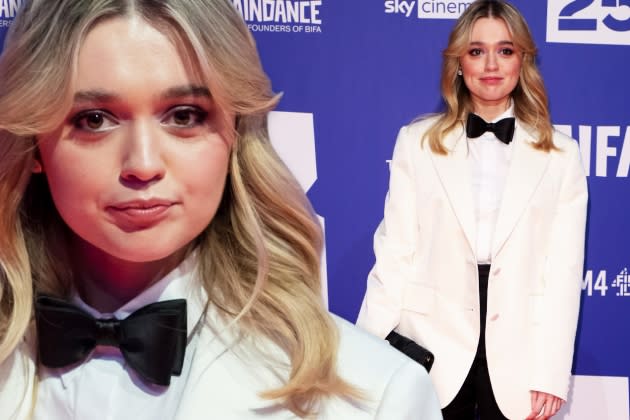
EXCLUSIVE: Aimee Lou Wood describes the young woman she plays opposite Bill Nighy in the acclaimed movie Living as the film’s “character of life.” It’s a performance that’s been steadily attracting awards season buzz, and is recognized in the BAFTA longlist, announced today.
However, Wood says that her other gig, as schoolgirl Aimee Gibbs in Netflix comedy Sex Education, is a very different matter because she finds herself playing someone “frozen in time.”
More from Deadline
Related Story
‘Living’ Star Bill Nighy Finds Inspiration And Humor In His Role As A Dying Man – Contenders L.A.
Related Story
'Ginny & Georgia' Creator Sarah Lampert Breaks Down Season 2, Talks Finale Cliffhanger, Its Aftermath & Potential Season 3
Related Story
'RRR' Director S.S. Rajamouli Talks About His Spectacular Action Epic And Reveals That The Ecstatic U.S. Reception Has Inspired A Sequel: "Nothing Is Impossible"
Wood’s laughs as she spells out the age of Sex Education’s Aimee, “she’s 17!”
Grinning, Woods says, “I was 24 when I started doing it, and I’m 28 now.” With a sigh, she adds,”nearly 29!”
She also pointed out that one season of Sex Education represents one school term in the show’s universe. So the fourth term beginning later this year represents nearly four years of actual work. Each season, Wood explains, takes seven months.
Swathed in black, in the kind of leggings, T-shirt and sweater ensemble favored by dancers at a rehearsal, she appears far younger than 28. She has the physicality of a dancer, and moves like one.
We’re seated in a cafe she has chosen in Bermondsey, on the south side of the Thames.
It’s early in the morning and Deadline is in need of an illicit biscuit and a cup of tea. We both tuck into truly illicit apricot croissants that have been baked on the premises.
Living, directed by Oliver Hermanus, is an English-language adaptation by Booker Prize-winning novelist Kazuo Ishiguro of Akita Kurosawa’s 1952 classic Ikiru, about Mr. Williams, played by Nighy, a suburban, faceless Englishman, set in his ways, who always does everything by the book as a senior local government bureaucrat in postwar London. Upon receiving a doom-laden diagnosis from his doctor, Mr.Williams develops a renewed interest in living when he meets Miss Margaret Harris, a junior in his office.
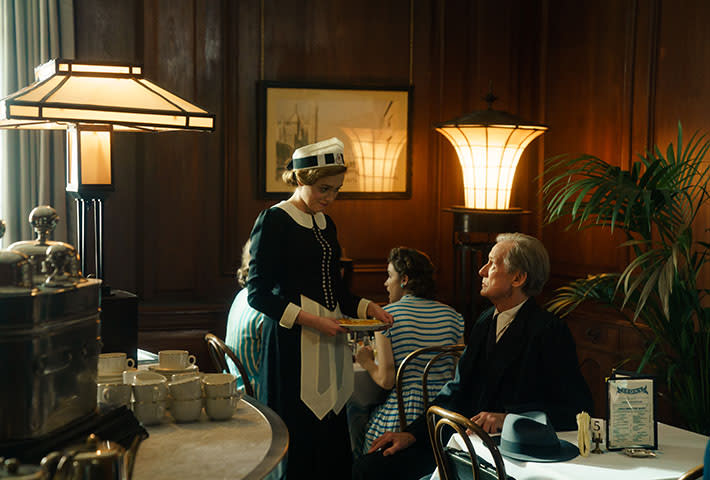
There’s nothing smutty about their relationship. “You somehow know it’s not kind of dark” between them, says Wood.
There’s a poignancy, though, one that has resonated with audiences in the U.S. where the film was released into selected theaters in Los Angeles and New York just before Christmas, a wider release for the Sony Pictures Classics Film and Film4 production, produced by Elizabeth Karlsen and Stephen Woolley at Number 9 Films, is imminent.
Wood is utterly radiant in the role, showcasing her dramatic and comic skills.
Not hard to see why BAFTA crowned her two years ago with a best comedy tv performance for her Aimee in Sex Education.
Her success though is no surprise to those who have observed her seemingly effortless stage prowess with Toby Jones in Uncle Vanya at London’s Harold Pinter, a version of which was filmed during the pandemic and later released in cinemas. Before that, Wood played in Bruce Norris’s provocative drama Downstate which had limited runs at the National Theatre in London and at Steppenwolf in Chicago.
She recalls that she got her first professional break while still a student at the Royal Academy of Dramatic Art. Robert Icke was preparing to direct his version of Friedrich Schiller’s historical drama Mary Stuart at the Almeida Theatre with Juliet Stevenson and Lia Williams.
Stevenson had the idea of asking students at RADA to play handmaidens. Wood was one of them. It led to years of friendship and mentorship from Williams, and indeed they found themselves working together on Living.
Wood has been lucky with mentors, she says, citing advice she has received from the likes of Cynthia Erivo, Phoebe Waller-Bridge, and others.
One day, she says, she’d love to return to the stage.
For now, though, she’s filming Sex Education until next month. A fifth season won’t be decided until later in the year.
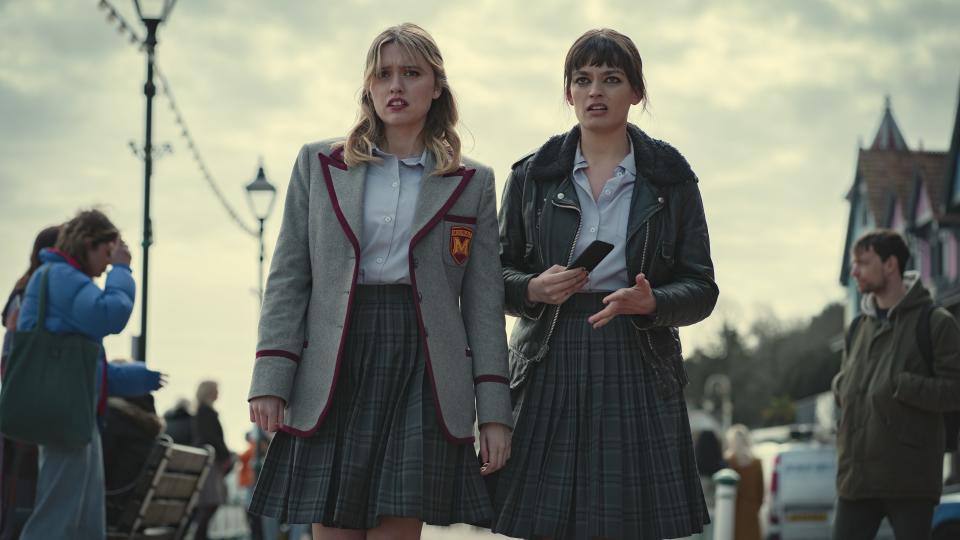
Meantime, Wood’s is living for Living.
DEADLINE: I realized that Mr. Williams [Bill Nighy’s character in Living] only has this renewed interest in living because of Miss Margaret Harris, your character?
AIMEE LOU WOOD: Well that’s what Oliver [Hermanus] says. Like Oliver always says, Margaret is life in Living.
She’s the character of life.
So it’s like, no pressure. And the reason why she is is quite simple. It’s just that she notices things. She just notices things and she delights in them. And she soaks in. She’s not on autopilot. She’s actually genuinely there. And that’s really what Mr. Williams sees is just someone who’s like just here and not in their own imaginary future and the imaginary past. She’s here.
RELATED: ‘Living’ Review: Bill Nighy In British Remake Of Akira Kurosawa’s Classic ‘Ikiru’
She’s in the present. Yeah. And that’s what it is. And he’s, to him that’s like, what the hell? Who are you? You know. Whereas as she says, I’m just an ordinary person, she really does see herself as that. And she’s just someone who’s able to be very present.
And I think that that is really inspiring though. And when you do meet people like that, you’re like, wow.
DEADLINE: I’ve been lucky enough to watch the film a bunch of times and each time I’ve seen little things that you, and Bill, do that I’d missed before. Strange thing, watching movies, isn’t it?
WOOD: Right. It’s weird someone else said that the second time that they watched it, they really saw the scene between Mr. Williams’s son [Barney Fishwick] and Margaret. And it wasn’t until the second time that they went, they realized this is such a big scene.
DEADLINE: Sometimes, not always, it’s good to watch a movie more than once, especially if it’s any good.
WOOD: I think especially one that’s quite… because Living is quite a small story. You kind of do just want to focus on one character per time that you watch it. You know what I mean? Like, because it’s so concentrated and there are real layers.
DEADLINE: So Miss Aimee Lou Wood, to borrow the film’s formality, how do you make it all look so seemingly effortless?
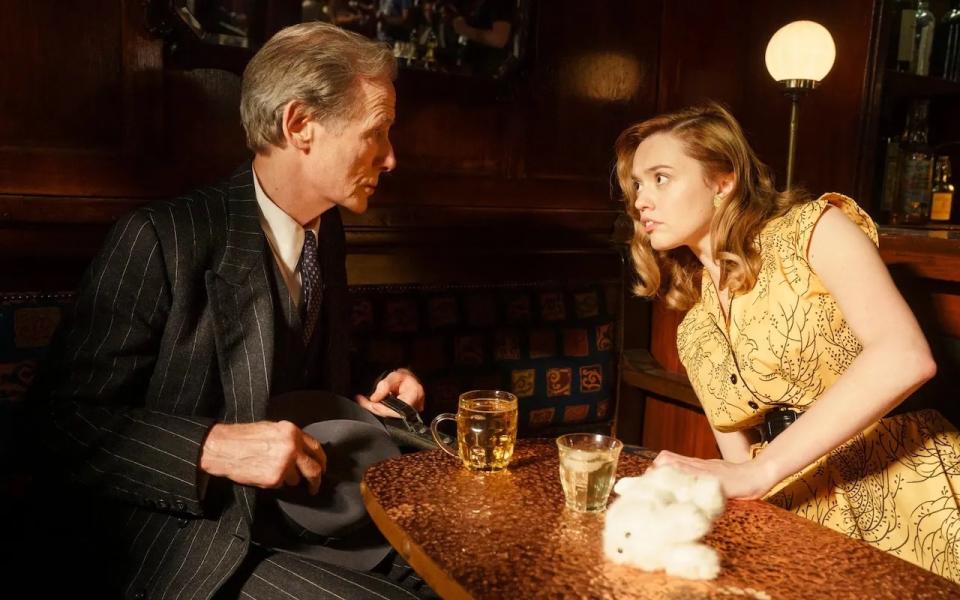
WOOD: That’s really nice of you. I am quite a perfectionist. So there’s a lot of turmoil that goes on because when I’m acting my main desire and want is to just be in the story, like I just wanna be in the story.
So whenever I feel like I’m not, or whenever I feel like I’m in a self-conscious space or ordained space – you know, which everyone can slip into sometimes when they’re thinking about themselves too much rather than the other person that they’re acting with or the story – that’s when I will be extremely irritated with myself. So I’m like always trying to just be in the story and not think about myself really at all and just be there.
I definitely have a lot of post match analysis. When I go home after a day of filming, I’m like, do this. But while I’m doing it, [the filming] I don’t really have that stuff. It’s the aftermath that I need to work on letting it go.
So, like, when I leave a day of work, I feel like I need to get better at just being like, it’s gone now. Especially with filming, because you are not gonna see that thing for months. And you don’t know what takes are gonna be chosen.
I didn’t have it that badly with Oliver [Hermanus] because he’s such an incredible director and I felt so safe and so respected. You know how some directors, it’s a strange thing they don’t like actors. They’re like, they kind of see actors as obstacles, whereas Oliver, he loves actors.
And he wants to know our ideas and he wants to collaborate with us.
And he creates that atmosphere on set that’s very much like – we’re gonna get a great performance because everyone’s gonna respect that this is an important thing that needs to be kind of focused. I think I had a lot of trust with Oliver because he also involved me so much from the beginning. As soon as he gave me the part he wanted to know all my thoughts, all my ideas and would meet me whenever I wanted to meet, would talk to me whenever I wanted to talk. So I kind of felt like I had ownership of it, rather than sometimes you feel like as an actor you are plunked in at the end of someone else’s stuff and then it’s like you’re just part of that machinery. Rather than actually having stakes in it.
I think Oliver wanted us all to feel like it was everyone’s movie. Every member of the crew, every member of the cast, it’s your movie. It’s not his movie, it’s everyone’s.
DEADLINE: Got it. Was there a discussion you had with him early on where you suddenly, both of you, or you alone, thought, OK, this is who Margaret is?
WOOD: You know what, I had it when I actually first read the script. Obviously, when I saw that Ish [Kazuo Ishiguro] had written it, I was like, ‘oh my God, this is gonna be great.’ I opened it up and I thought: prepare yourself because I know it’s gonna be emotional. I just read his Klara in the Sun. And he’s just the greatest writer and he’s the greatest person. He’s so kind.
His kindness just comes through in his work because he’s so kind. Him and his wife Lorna they’re just, oh my God. But it was just that line when Margaret sees Mr. Williams on the street and she says, “I was a bit thrown for a second by your new hat.” That line. I went, I know who she is. I know who she is.
She’s someone who notices things so much that him wearing a new hat is like, what? What? Oh, you have a new hat? And I just went, that’s who Margaret is. And from then on even her first line of dialogue about when she’s saying to Peter [Peter Wakeling played by Alex Sharp] about keep your skyscraper high, because if you don’t, people will think that you don’t have anything important to do. The way that she’s cheekily saying that in that room of men, the way that she’s playing with those [office rules imposed by men]. And like Mr. Williams says sometimes, ”I don’t think your attitude was maybe appropriate,” or whatever. She’s, from the start, she’s just a little bit cheeky.
She’s a little bit, yeah, she’s mischievous.
DEADLINE: Mischievous. That’s the word…in a good way.

WOOD: That hat line just really did that for me. I was like, that is so funny that she would see Mr. Williams and be thrown by the fact that he’s wearing a new hat. I just thought that that was such a lovely detail. And his writing is so economic, you just know who she is from the smallest thing.
DEADLINE: And you sense something about them instantly that you almost don’t question why she goes along with him. And you somehow know it’s not kind of dark.
WOOD: No, no.There was a point when I was reading it, I thought, oh no, I was nervous. But I love that bit when she says, you know, you’re becoming infatuated. And he’s like, “Maybe I am in a way. But not in that way…” It’s so sweet.
And Bill [Nighy] just, oh my God, those scenes.
He was heartbreaking. I mean it was really quite something to be that close to watching this man that I’ve admired since for as long as I can remember and him kind of reduce all that sparkle that he has and just go so small and so lost. It was really heartbreaking.I had a headache because I was crying so much.
DEADLINE: He’s a great actor. It’s a great performance, isn’t it?
WOOD: Same.Same. I think that what I loved about Bill was that he had such an empathetic view of Mr. Williams because that repression and that stiff upper lip and all that, obviously it’s not very healthy. We know that. We know that it’s not healthy for a man to be saying ”bit of a bore” before he talks about the fact that he’s dying.
But what I loved about Bill is that he had a very empathetic read on it. And although it’s not healthy, there was something admirable about that stoicism. He said, I recognize that kind of person… that generation.
DEADLINE: When I was younger I’d occasionally bump into an old women or man on the bus or tube and you’d chat and suddenly you’d realize that they saw service in some form during the war, and probably saved hundreds of lives, and I love all that stuff.
WOOD: It’s amazing. Oh same. I love all that.
Like, you know, I always love making friends with older people which is why I also love this story because I’ve always been like that. Like I feel much more comfortable around older people than my own age group because I just love the stories and also the perspective. The perspective is so much wider.
I’ll speak to one of my friends who’s much older than me about a problem, that to me would seem like my world is over and it’s just like a drop in the ocean to them.
And it’s like, wow. OK. And what I love about Living is that it’s kind of the other way around that it’s the younger person who teaches the older person.
And I also love that Mr. Williams is open to being led by and taught by someone much younger than him.
Because a lot of people do think that as they get older there’s kind of like a full stop next to their name. They’re done. That’s who they are. That’s it. No one can teach them anything. And actually the key to life is just staying curious, isn’t it? And keep on living and learning and everyone you meet can teach you something.
I find that it’s very relevant to now, has a lot to do with our [cell] phones. It’s so about not being on autopilot. And I feel like we’re so on auto-pilot now and there can be days that go by where you go: was I present for any of that day? Or was I in my head or on my phone? Or like was I actually like present? Was I actually in the day.
DEADLINE: No social media, no phones…
WOOD: Margaret doesn’t have a mobile phone to pick up in her mindless moments. She doesn’t pick up her phone. She has to see things [snaps fingers] and do things [snap] and notice things [snap]. I think it is so relevant for today. She’s way more concerned with her experience of life than how she’s being perceived by others.
DEADLINE: That’s why the young must experience real living …
WOOD: This generation, it’s so sad because their main concern is like curating a life that looks great to other people rather than living a life that feels great to them. And I find that really sad. And how you can be having the worst day of your life, but on social media it looks like you are having the best time ever.
And with Margaret, she moves jobs to one that might seem a bit less respectful because she wants to have a better time. She’s less bothered about what people think of her and how she’s perceived and what those men in the office will think of what her life looks like.
She wants to be in a life that she enjoys. That’s her main thing. She wants to live a life that she, she feels good about.
And I really found that inspiring. I was like, yes, make the choices that are right for you.
DEADLINE: Yeah, choose life.
WOOD: Choose life, not what it appears to be.
Appearances don’t really matter to Margaret. And I think Mr. Williams also sees that because he’s someone who says he wants to appear like a gentleman.
DEADLINE: You were saying earlier that you like old people. Were you raised by grandparents or something… ?
WOOD: Well, I was very close to my mom’s parents, very close. And I lived with my nana and granddad and mom for a year. Like I’ve always just loved being with my nana and granddad. Like they’re just the best .And my granddad was such a storyteller as well. Looked like Father Christmas, told all these great stories. His name was Michael and all the men in my family are called Michael, like my dad’s called Michael…yeah, weird.
DEADLINE: You are the eldest of four children…?
WOOD: Which people sometimes go like, ‘I always think you give youngest vibes.’ But I’m very much the eldest child.
DEADLINE: Were you a bossy big sister?
WOOD: No. You know how the eldest kind has to be the most well behaved because then the younger ones can come along and kind of break the rules.
So I feel like I was always the most well behaved and the most kind of dutiful until I left home. I think it probably does come from being really close to my grandparents. My nana is the funniest. She’s in her eighties, but honestly everyone thinks she’s sixty. She’s so youthful and she’s very active, but that happened when my granddad died, you know.
She became very sociable because it’s like she had a choice. It’s very like Mr. Williams. Like she had a choice of either I’ve lost this person who I’ve been with my entire life since I was 16, this is the end for me. Or it could be a new kind of beginning. And I think that happens a lot.
And it’s very resonant. This film will resonate a lot with people who have made that choice. They’ve been at that crossroads where they’ve gone, this is the end. Or it doesn’t have to be the end.
DEADLINE: You’re best known for Sex Education on Netflix. You’re working on your fourth season now, is that right ?
WOOD: Fourth, and there’s supposed to be a fifth. But I think it always depends on, I think we always know in the first week [of transmission] whether it’s gonna be renewed.But yeah, it’s interesting.
DEADLINE: So how old were you when you started doing that?
WOOD: I was 24 when I started doing it, and I’m 28 now. Nearly 29.
DEADLINE: And how old is Aimee Gibbs in Sex Education?
WOOD: She’s 17 [laughs]!
DEADLINE: And what are your views on this?
WOOD: It’s really hard playing someone who’s frozen in time. Genuinely, it’s really hard. Because in your twenties, like my mom was saying the other night, you start finding a bit of consistency in your thirties.
You like go from 31 to 32 and you’re kind of still the same person. You don’t have any of that in your twenties. You just change so much every year that like going back to playing someone who’s at the same point in their life, I’m starting to find a little bit challenging because I love her.
But you know, I might like feel like I’m really like every year just facing things and changing and then I go back to playing someone who got the part when I was a completely different person.
DEADLINE: Was it your first television role?
WOOD: It was my first TV role. And it’s been the most amazing. That’s weird, Asa [Butterfield] just went past on the bus. A picture of him just went past.
DEADLINE: Oh, that’s so funny just as we’re talking about the show that you’re both in.
WOOD: Weird, yeah. And it’s been the best and I’ve made the best friends.
We all did our marketing photos the other day, all of us, and Ncuti [Gatwa] was looking at the photos and he was going, “they are 30 year olds, they are 30 year olds.” And I think that we’re all just starting to be like, we’re adults, when we started we all felt very young and we all found that very easy to act that very like didn’t feel that long ago.
And now it’s fine. I’m playing somebody who’s 10 years younger than me, more than. And I still adore her. But it’s getting into that mind frame of, this person is in this completely different stage of life to me. I have been through so, so many changes. And she’s still in the same point.
But every season’s supposed to be a term of school. So we’ve only had three terms. This will be the fourth term.
DEADLINE: So in the world of the show, it’s not even a year,is it?
WOOD: No. So, and it’s been four years.
DEADLINE: I don’t think I know people who had that much fun going on at school.
WOOD: I think it’s like it’s that kind of timeless, placeless world that has very real human stories in it. But it’s almost like a utopia. And it’s a utopia because everyone talks because therapy is at the center of it, right?
The whole concept is built around therapy. So it’s basically a world in which everyone talks about their problems. Freely, openly, and constantly.
So it isn’t almost utopia because we don’t do that. We have a lot more of the living side – generally, with maybe splashes of that.There’s an openness to it and a boldness that is heightened. It’s not what we experience. So, you know, people don’t have those kinds of conversations constantly. Like they don’t have, every time they sit with their friend, they don’t reveal their feelings or their innermost thoughts whereas in Sex Education they do, and yes, a lot of revealing, yes.
DEADLINE: And can I just ask whether or not over time you have resented all of that revealing?
WOOD: All that stuff was, especially in season one, it was so vital to Aimee’s story. And it wasn’t gratuitous. I think if it was not connected to the story and it wasn’t needed then why do it? Now, I always have the confidence to be like, this is unnecessary. This actually doesn’t need to be in here.
Whereas if it’s connected to the story, then I’m very willing to have a conversation about it and to discuss it, which is what in season one I was very much involved in the conversation. I’m like, is this telling a story?
DEADLINE: So when you are a student, when you are seeing Lia Williams and Juliet Stevenson and Cynthia Erivo and other alumni who visited RADA, what goes through your head? Do you think, oh God, I wanna do that? I can’t do that? All of those?
WOOD: All of those. I think it’s really helpful that thing of having people come back in [to RADA], because I think what happens is everyone ends up kind of relating to their experiences.
[Editor’s Note: We’re interrupted by the arrival of a freshly baked apricot croissant which Deadline has dubbed an illicit biscuit].
Is it good? Is it good? Oh God, I have to try now. [Aimee tries her apricot croissant].
Yeah, that’s good.
Illicit Biscuit does sound like an indie band.
Welcome to the stage, Illicit Biscuit!
DEADLINE: Cool name for a band.
WOOD: [laughs]. Yeah, it’s good because I think everyone ends up relating to different people. Cynthia stood in a tiny classroom and sang an Aretha Franklin song …I can’t remember which one but it was Aretha Franklin. So like, Phoebe Waller-Bridge came in. She was very honest about the fact that it wasn’t really for her drama school. Like, she was kind of like in movement classes lying on the floor being made to do. And she would be laughing and thinking it was all a bit silly.
And I think hearing things like that, people felt like relieved because you kind of get, you know, you go to RADA and it’s very like, you know, you feel like you really have to buy into everything you are being taught, whereas actually, in reality, you’re gonna take bits. You’re gonna take bits that are useful.
And you’re gonna maybe discard some of the stuff that isn’t useful, but at the time you think, I’ve gotta take it all. You know, you’re doing animal studies and you’re crawling around the floor and you’re thinking this…For some people that genuinely might be a really helpful way in for them to pretend to be a, you know, a squirrel, might really help them access a character, but for other people it’s not gonna do that.
But you kind of feel like everything should be the key in, the key into the secret. And of course it’s different for everyone. So I think it’s very relieving hearing actors who were out in the world come back and go, “I don’t use any of that, but I do use this.”
And a lot of people would say it, it’s only kind of three years after you’ve left drama school and you’re doing a part, and all of a sudden you go, oh, that’s what they meant.
It all makes sense.
DEADLINE: OK. That explains to me also why you were, when I saw you as Sonya in Uncle Vanya [opposite Toby Jones] it just seemed totally effortless to me. We know that you’ve studied acting but we don’t see that effort, that struggle to have reached this point.
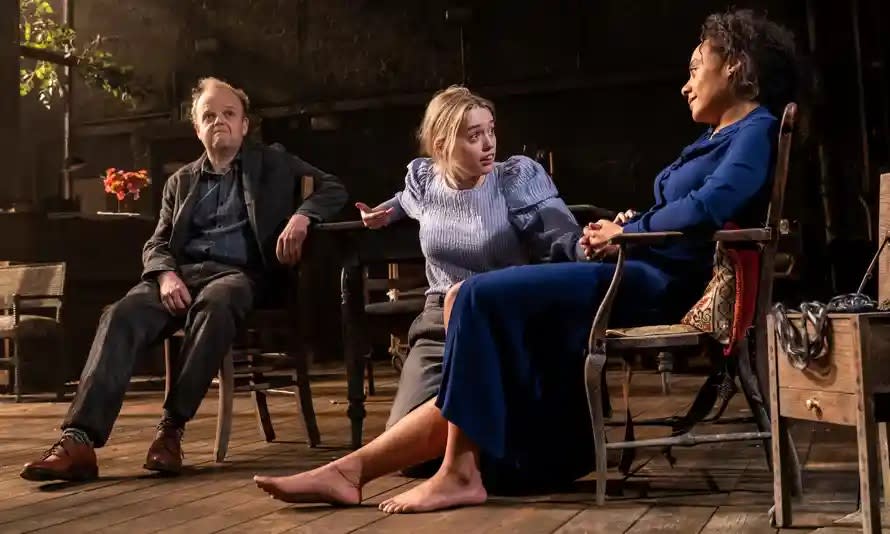
WOOD: It was quite intimidating. I remember my first day I actually cried. Because I was so overwhelmed. And Ian [director Ian Rickson] had a chat with me. Ian took me aside and said, “You know, you are supposed to be here, you are gonna be…” But it was walking in and it was just, yeah, I felt very overwhelmed. After about three days I realized that everyone was just the greatest.
And everyone was nervous. I mean, Toby [Jones] was playing Uncle Vanya, so he was just thinking about, “Oh my God, I’m doing this. This is huge.“ He wasn’t thinking about, let’s have a look at Aimee and see where she’s doing wrong. Do you know what I mean?
And I made really good friends with everyone, and Anna Calder-Marshall [who played Nana in Uncle Vanya], me and her just made best mates. And we just had all of our lunches together. She’s very magical.
She’s very kind of otherworldly. We would have lunches together and our chats were just so good. And she called me every night in my dressing room. She would call me on my phone just before my scene. She would call me and say, “How do you think it’s gonna go? I think it’s gonna be great. I think the doctor loves you back. I think…” And every night we’d have a conversation, so that when I walked on stage, I had just had that chat with Nana.
DEADLINE: I love it when people of that stature take the time to pass it on. Gary Oldman was talking the other day about being on the Harry Potter movie sets and talking to Alan Rickman and Maggie Smith and Emma Thompson, and they’d be sitting there blithely chatting away not realizing that all the younger actors were soaking up every word.
WOOD: Oh God, we really do. We’re all like, what was that? What was that bit?
Well, I’ve just finished Alan Rickman’s diaries [Madly,Deeply: The Alan Rickman Diaries]. Oh my God. They are just so funny. I love the way he talks about his friends. ‘Cause he obviously loves them fiercely, but he’s so honest about them. What I love about him is that he seemed to really like to see people fully, you know, he saw them in their complexity and in their fullness.
Best of Deadline
TV Cancellations Photo Gallery: Series Ending In 2023 & Beyond
Hollywood & Media Deaths In 2023: Photo Gallery & Obituaries
2023 Premiere Dates For New & Returning Series On Broadcast, Cable & Streaming
Sign up for Deadline's Newsletter. For the latest news, follow us on Facebook, Twitter, and Instagram.

 Yahoo News
Yahoo News 
